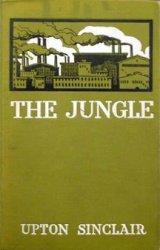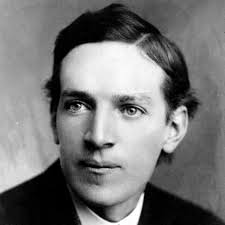The Jungle Page #27
The Jungle is a 1906 novel by the American journalist and novelist Upton Sinclair. Sinclair wrote the novel to portray the harsh conditions and exploited lives of immigrants in the United States in Chicago and similar industrialized cities.
Now the dreadful winter was come upon them. In the forests, all summer long, the branches of the trees do battle for light, and some of them lose and die; and then come the raging blasts, and the storms of snow and hail, and strew the ground with these weaker branches. Just so it was in Packingtown; the whole district braced itself for the struggle that was an agony, and those whose time was come died off in hordes. All the year round they had been serving as cogs in the great packing machine; and now was the time for the renovating of it, and the replacing of damaged parts. There came pneumonia and grippe, stalking among them, seeking for weakened constitutions; there was the annual harvest of those whom tuberculosis had been dragging down. There came cruel, cold, and biting winds, and blizzards of snow, all testing relentlessly for failing muscles and impoverished blood. Sooner or later came the day when the unfit one did not report for work; and then, with no time lost in waiting, and no inquiries or regrets, there was a chance for a new hand. The new hands were here by the thousands. All day long the gates of the packing houses were besieged by starving and penniless men; they came, literally, by the thousands every single morning, fighting with each other for a chance for life. Blizzards and cold made no difference to them, they were always on hand; they were on hand two hours before the sun rose, an hour before the work began. Sometimes their faces froze, sometimes their feet and their hands; sometimes they froze all together--but still they came, for they had no other place to go. One day Durham advertised in the paper for two hundred men to cut ice; and all that day the homeless and starving of the city came trudging through the snow from all over its two hundred square miles. That night forty score of them crowded into the station house of the stockyards district--they filled the rooms, sleeping in each other's laps, toboggan fashion, and they piled on top of each other in the corridors, till the police shut the doors and left some to freeze outside. On the morrow, before daybreak, there were three thousand at Durham's, and the police reserves had to be sent for to quell the riot. Then Durham's bosses picked out twenty of the biggest; the “two hundred” proved to have been a printer's error. Four or five miles to the eastward lay the lake, and over this the bitter winds came raging. Sometimes the thermometer would fall to ten or twenty degrees below zero at night, and in the morning the streets would be piled with snowdrifts up to the first-floor windows. The streets through which our friends had to go to their work were all unpaved and full of deep holes and gullies; in summer, when it rained hard, a man might have to wade to his waist to get to his house; and now in winter it was no joke getting through these places, before light in the morning and after dark at night. They would wrap up in all they owned, but they could not wrap up against exhaustion; and many a man gave out in these battles with the snowdrifts, and lay down and fell asleep. And if it was bad for the men, one may imagine how the women and children fared. Some would ride in the cars, if the cars were running; but when you are making only five cents an hour, as was little Stanislovas, you do not like to spend that much to ride two miles. The children would come to the yards with great shawls about their ears, and so tied up that you could hardly find them--and still there would be accidents. One bitter morning in February the little boy who worked at the lard machine with Stanislovas came about an hour late, and screaming with pain. They unwrapped him, and a man began vigorously rubbing his ears; and as they were frozen stiff, it took only two or three rubs to break them short off. As a result of this, little Stanislovas conceived a terror of the cold that was almost a mania. Every morning, when it came time to start for the yards, he would begin to cry and protest. Nobody knew quite how to manage him, for threats did no good--it seemed to be something that he could not control, and they feared sometimes that he would go into convulsions. In the end it had to be arranged that he always went with Jurgis, and came home with him again; and often, when the snow was deep, the man would carry him the whole way on his shoulders. Sometimes Jurgis would be working until late at night, and then it was pitiful, for there was no place for the little fellow to wait, save in the doorways or in a corner of the killing beds, and he would all but fall asleep there, and freeze to death.
Translation
Translate and read this book in other languages:
Select another language:
- - Select -
- 简体中文 (Chinese - Simplified)
- 繁體中文 (Chinese - Traditional)
- Español (Spanish)
- Esperanto (Esperanto)
- 日本語 (Japanese)
- Português (Portuguese)
- Deutsch (German)
- العربية (Arabic)
- Français (French)
- Русский (Russian)
- ಕನ್ನಡ (Kannada)
- 한국어 (Korean)
- עברית (Hebrew)
- Gaeilge (Irish)
- Українська (Ukrainian)
- اردو (Urdu)
- Magyar (Hungarian)
- मानक हिन्दी (Hindi)
- Indonesia (Indonesian)
- Italiano (Italian)
- தமிழ் (Tamil)
- Türkçe (Turkish)
- తెలుగు (Telugu)
- ภาษาไทย (Thai)
- Tiếng Việt (Vietnamese)
- Čeština (Czech)
- Polski (Polish)
- Bahasa Indonesia (Indonesian)
- Românește (Romanian)
- Nederlands (Dutch)
- Ελληνικά (Greek)
- Latinum (Latin)
- Svenska (Swedish)
- Dansk (Danish)
- Suomi (Finnish)
- فارسی (Persian)
- ייִדיש (Yiddish)
- հայերեն (Armenian)
- Norsk (Norwegian)
- English (English)
Citation
Use the citation below to add this book to your bibliography:
Style:MLAChicagoAPA
"The Jungle Books." Literature.com. STANDS4 LLC, 2025. Web. 9 Mar. 2025. <https://www.literature.com/book/the_jungle_272>.








Discuss this The Jungle book with the community:
Report Comment
We're doing our best to make sure our content is useful, accurate and safe.
If by any chance you spot an inappropriate comment while navigating through our website please use this form to let us know, and we'll take care of it shortly.
Attachment
You need to be logged in to favorite.
Log In